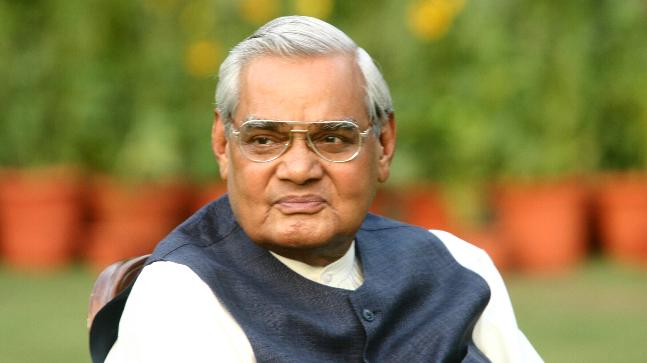Former PM Atal Bihari Vajpayee Breathes His last

New Delhi: Former Prime Minister Atal Bihari Vajpayee died at 5.05pm on Thursday after prolonged illness. He was 93.
The veteran leader was undergoing treatment at AIIMS for the last nine weeks. He was admitted to AIIMS on June 11 following acute chest pain. However, his condition gradually deteriorated after the failure of one of his kidneys and acute infection in the urinary tract. He was put on life support on Wednesday night after his condition became critical.

The former Prime Minister was born on December 25, 1924 in Gwalior. He was a politician, a poet and an excellent orator. He was also known for his spellbinding expressions.
A Politician Of All Seasons
As a RSS member, he followed the hard-line Hindutva politics opposing Gandhi’s secular ones, and he built his identity around his organisation’s ideology.
Vajpayee ruled the country for 13 days in 1996, 13 months in 1998 and for almost six years from 1999.
He occupied a number of distinguished positions during his long and illustrious political career, including those of the Leader of the Opposition and the Foreign Minister, before he took office as India’s Prime Minister on October 13, 1999.
He was India’s only non-Congress prime minister to last a full five years in office.
Vajpayee had his first foray into electoral politics in 1955 when he contested the by-election for the Lucknow Lok Sabha seat vacated by Vijayalakshmi Pandit. He lost.
He entered Parliament by winning Balrampur Lok Sabha seat in the second general elections in 1957 and his maiden speech won him praises from many contemporary veteran parliamentarians, including the then Prime Minister Jawaharlal Nehru who, while introducing Vajpayee to a visiting foreign dignitary once said “this young man one day will become the country’s Prime Minister”.
However, Vajpayee lost the seat to Subhadra Joshi of the Congress in 1962 but recaptured it in 1967. He won from Gwalior in 1971, New Delhi in 1977 and 1980 and Lucknow in 1991, 1996 and 1998.
He lost to Madhavrao Scindia by a margin of close to two lakhs votes from Gwalior in 1984.
On two occasions, he won from two different seats in two different states. In 1991, he won from Vidisha in Madhya Pradesh and Lucknow in Uttar Pradesh. In 1996, he won from Gandhinagar in Gujarat and Lucknow in Uttar Pradesh.
He was elected to the Lok Sabha 10 times and the last time he fought and won was from Lucknow in the 2004 election.
He was member of the Rajya Sabha twice — 1962-67 and 1986-89.
Achievements
Mending Ties: In 1999, the 10th Prime Minister of India started the Delhi Lahore Bus Service to strengthen the political and diplomatic ties with neighbouring Pakistan.
The Gusty PM: Vajpayee made India a nuclear state by conducting Pokhran tests with five bombs in May 1998. On May 11, 1998, he announced, “Today at 1545 hrs., India conducted three underground nuclear tests in the Pokhran range. The test conducted today were with a fission device, a low yield device and a thermonuclear device.”
Ambitious Project: Golden Quadrilateral is the brainchild of Vajpayee. It is basically a network of highways that connect the four major metropolitan cities of the country in four directions – Delhi (North), Chennai (South), Kolkata (East) and Mumbai (West).
Operations Vijay: In 1999, two months after the bilateral summit in Lahore, India discovered that Pakistan army disguised as terrorists had infiltrated through the Line of Control (LoC) into the state of Jammu and Kashmir. In response, the Indian armed forces launched Operation Vijay to evict the infiltrators. By July 1999, the Indian forces had reclaimed territories on its side of the LoC.
Education For All: Sarva Shiksha Abhiyan, a social scheme to provide universal access to free elementary education for children aged 6-14 years, was launched by the Vajpayee-led government in 2001. Within four years of its implementation, the number of out-of-school children dropped by 60 percent.
An Excellent Orator
His poetic and spellbinding speeches always drew attention. Vajpayee was known for his fiery speeches in Hindi and as an wordsmith. Vajpayee had told his friend NM ‘Appa’ Ghatate that he learned these basics about public speaking from his own father, who Vajpayee said was equally good in English and Hindi.
Vajpayee rose quickly up the ranks but Jawaharlal Nehru, India’s first prime minister, remained his idol. Nehru described the young Vajpayee as a ‘bright prospect’.
For his oratorical skills, Vajpayee earned respect from across the spectrum.
The Poet
Vajpayee was fond of Indian music and dance. His poetry was marked by nationalistic fervour and human values. He believed that poetry should awaken a sense of duty and social responsibility in people. He was inspired by Hindu mythology and his poetry was rich in religious symbolism.
“Politics and literature do not belong to the separate compartments. Rather they enrich and refine each other. When a litterateur gets involved in politics, his politics gets more refined. Similarly if a politician has a literary background he cannot ignore human feelings and emotions,” he had once said.
He started to create poems from the time when he was jailed during Emergency. ‘Kaidi Kaviraj Ki Kundalian’ and ‘Amar Aag Hai‘ were published in 1994.
Some of his poetry collections are, ‘Meri Ikyavana Kavitaem’, ‘Sreshtha Kabita’, ‘Nayi Disha-An Album with Jagjit Singh’, ‘Kya Khoya Kya Paya: Atal Bihari Vajpeyee’, ‘Vyaktitva Aur Kavitaem’ and ‘Samvedna-An Album with Jagjit Singh’.
One of his poems on Jammu and Kashmir ‘Mastak Nahi Jhukega’ sums up India’s position on the issue.
Awards
He has received many honours including Padma Vibhushan (1992), Lokmanya Tilak Award (19914), Outstanding Parliamentarian Award (1994) and Bharat Ratna (2015).

Comments are closed.